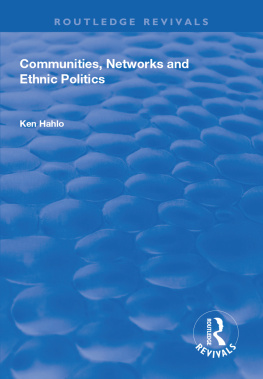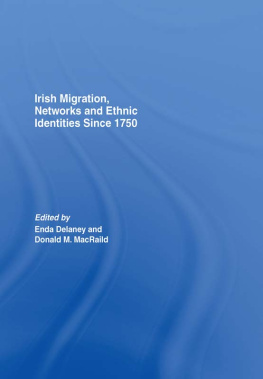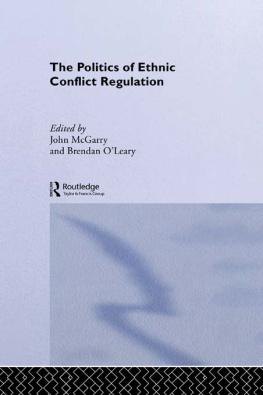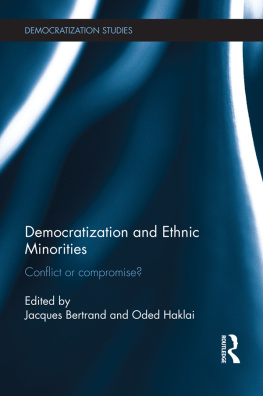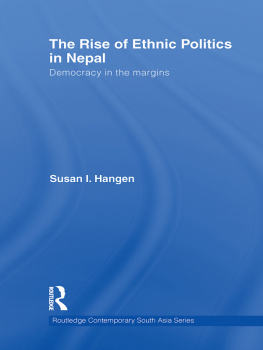Communities, Networks and Ethnic Politics
KEN HAHLO
First published 1998 by Ashgate Publishing
Reissued 2018 by Routledge
2 Park Square, Milton Park, Abingdon, Oxon, OX14 4RN
711 Third Avenue, New York, NY 10017
Routledge is an imprint of the Taylor & Francis Group, an informa business
Copyright Ken Hahlo 1998
All rights reserved. No part of this book may be reprinted or reproduced or utilised in any form or by any electronic, mechanical, or other means, now known or hereafter invented, including photocopying and recording, or in any information storage or retrieval system, without permission in writing from the publishers.
Notice:
Product or corporate names may be trademarks or registered trademarks, and are used only for identification and explanation without intent to infringe.
Publishers Note
The publisher has gone to great lengths to ensure the quality of this reprint but points out that some imperfections in the original copies may be apparent.
Disclaimer
The publisher has made every effort to trace copyright holders and welcomes correspondence from those they have been unable to contact.
A Library of Congress record exists under LC control number: 98073405
ISBN 13: 978-1-138-62463-4 (hbk)
ISBN 13: 978-1-138-62464-1 (pbk)
ISBN 13: 978-0-429-46065-4 (ebk)
Contents
Assistant Community Relations Officer | ACRO |
Bolton Council for Community Relations | BCCR |
Bolton Evening News | BEN |
Bolton Racial Equality Council | BREC |
Commission for Racial Equality | CRE |
Community Relations Council | CRC |
Community Relations Officer | CRO |
Islamic Culture Centre | ICC |
Minorities Joint Consultative Committee | MJCC |
Racial Equality Council | REC |
Vishwa Hindu Parishad | VHP |
This book is based on research carried out between 1973-76 and I would like to acknowledge my thanks to the late Clyde Mitchell for his support and Peter Braham. Many people have contributed directly and indirectly to this book. I would like to thank Tom Tootell and Raymond Halliwell, who as CROs for Bolton Council for Community Relations and the latter as Director of Bolton Race Equality Council, always offered support and encouragement over many years. Ron Mather, John Urry, Roger Penn, and Muhammad Anwar have very kindly read drafts of the book and commented on it. Although I have incorporated most of their comments, the responsibility for what is written is mine.
The research for this book was originally supported by the SSRC (now ESRC) and Bolton Metropolitan Borough Council. I would like to acknowledge my thanks to the ESRC for this grant. This research would not have been possible without the support and help of the Gujarati Hindu and Muslim communities, the Vishwa Hindu Parishad, and the late Yusuf Suleman. I would like to thank Sandra Whittleston, Margaret Gilmour, Ingrid Bevan and Tony Heywood for their help in preparing the book for publication.
The tables, diagrams and maps are drawn from my Ph.D thesis, and most have been modified.
There are few studies of South Asian ethnic politics in Britain and most of these were done in the 1960s. With the mistaken view that CRCs were buffer organisations (Katznelson, 1973), interest in ethnic politics waned with changes in the role of CRCs. Also with the emergence of ethnic social and religious organisations at the end of the 1960s (Ballards, 1977), attention shifted to other forms of political participation, in particular voting. A number of significant community studies confirmed the importance of these developments (Robinson, 1986; Shaw, 1988; Werbner, 1989; Eade, 1989). These studies either stressed assimilation or integration (Robinson, 1986), or pointed to the robustness of ethnic communities and their cultures (Werbner, 1989), or to a combination of these approaches in the context of a community framework (Eade, 1989). The relationships between ethnic communities and political participation were explained in terms of their political commitment to voting in elections (Anwar, 1980, 1994) and to support of political parties (Solomos and Back, 1994; Lawrence, 1974). The importance of ethnic politics was set aside as being another form of political participation along with withdrawal from political participation and opposition to racism (Layton-Henry, 1984). However, as Ben-Tovim et al (1986) demonstrated in their analysis of ethnic politics in Liverpool, the importance of ethnic politics and CRCs was central to the political representation of ethnic communities in a political situation in which white political parties held sway. This book will add to existing community studies, but more importantly will focus attention on ethnic politics.
The studies of ethnic politics in the 1960s and early 1970s concentrated on issues of ethnic and racial discrimination and the reactions of ethnic communities to them (John, 1969; Scott, 1972/73; Beetham, 1970). Strikes at Grunwick and Imperial typewriters brought into focus other situations in which organised ethnic opposition had a political element. Saggar (1990) in his review of ethnic political participation pays little attention to ethnic politics and concentrates principally upon participation in formal politics. Ethnic politics was interpreted as a form of local political activity. It became seen as a form of political activity that had to be discouraged. Anwar (1994; 1986; 1980) has demonstrated over many years that Asians commitment to participation in elections as voters has not brought them success in terms of seats locally or nationally. Layton-Henry (1984) identified some other forms of political participation in addition to voting. He makes the point that buffer organisations did give ethnic minority communities an additional degree of political participation. This raised the issue of ethnic minorities benefiting from additional forms of political participation compared to white communities (Solomos, 1989). Although Solomos did raise the issue of some form of political organisation which could represent ethnic communities, possibly regionally, this idea seemed to be unrealistic.
My argument is that ethnic politics should be regarded not as a form of local politics that only emerges when a local community chooses to oppose some rule that conflicts with their ethnic culture. Ethnic politics, as the term is used here, is seen as a form of political participation, in addition to voting, which enables ethnic communities to influence local political decisions. As such it needs some arena and this, I shall argue, was provided by local Community Relations Councils (CRCs, now called Racial Equality Councils, RECs). In Britain democracy is based upon political parties and their competition in elections. Other forms of organised political participation are generally regarded as lying outside politics or are accepted as a form of fringe activity, such as lobbying and interest group pressure. Ethnic politics, which depends upon non-political forms of organisation, developed alongside the emergence of ethnic social organisations and communities. Because these organisations have no political standing, politicians see them at best as non-political voluntary organisations and at worst as pressure groups. Thus their assumption of a political role was regarded as unacceptable in a political democracy which is based on political parties. Though membership of political parties is open to all people irrespective of their ethnic origins, control of the allocation of seats in local and national politics lies in the domain of predominantly white members. Black sections, once seen as a possible way of increasing ethnic participation, came to nothing (Hall, 1985). Through the 1970s CRCs provided ethnic communities and their men in influential positions (so-called leaders) with opportunities to participate in local politics (Ben-Tovim


